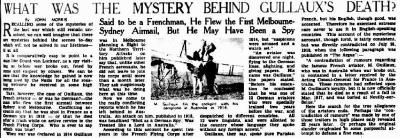The Argus, Saturday 23 November 1940, page s01
WHAT WAS THE MYSTERY BEHIND GUILLAUX'S DEATH?
Said to be a Frenchman, He Flew the First Melbourne Sydney Airmail, But He May Have Been a Spy
By JOHN MORRIS
RECALLING some of the (mysteries of the last war which still remain unsolved, we can well imagine that there are mysteries behind the scenes to-day which will not be solved in our lifetimes ii at all. i
It is comparatively easy to point to a man like Count von Luckner, as a spy visiting us before war broke out, feted by some and suspect by others. We can be sure that the knowledge he gained is now being used by the Nazis for all the rousing welcome he received in some high circles.
Take, however, the case of Guillaux, the French aviator - or was he German? - the man who flew the first airmail between Sydney and Melbourne. Conflicting accounts say that he was shot in France as a German spy in 1918 - or that he died after a crash while on active service in the French Flying Corps. Who is ever to say which was true?
When war was declared in 1914 Guillaux was in Melbourne planning a flight to the Northern Territory. Attacks on him published later say that, unlike other French aeronauts, he did not leave to join his corps until more than a month later. They ask suspiciously what was he doing here at this time.
Now we come to the really conflicting reports which he has left behind in Australia. An attack on him, published in 1918, was headlined "Shot as a German Spy; Was Treated like a Lord in Australia."
According to this account he spent two years in the French Flying Corps after 1914, but "suspicions were aroused and a watch set."
"An aviator was discovered one night, flying to the German lines, alighting, and giving papers. His name was Guillaux," the papers stated. "Before his execution he confessed that he was one of 12 German aviators who were specially trained two years before the war, and despatched to different countries. All 12 were linguists, and were allotted to the country whose language they spoke without any foreign accent."
Guillaux, they say, spoke pure Parisian French, but his English, though good, was accented. Therefore he exercised extreme care never to use it in English-speaking countries. This account of the mysterious aeronaut, though lurid, is fairly consistent, but was directly contradicted on July 25, 1918, when the following paragraph was published in "The Argus":
"A contradiction of rumours regarding the famous French aviator, M. Guillaux, who was in Australia when war broke out, is contained in a letter received by the Acting Consul-General for France in Aus» tralla. These rumours had reflected upon M. Guillaux's loyalty, but it is now officially stated that he died as a result of a fall in May, 1917, and was buried at Neuilly-sur-Selne."
Here the search for the true allegiance of the aviators ends. Perhaps the "contradiction of rumours" was made by one of those traitors in high places only revealed 22 years later. Or perhaps the original slander originated in some purposeful attempt to defame a fine man.









